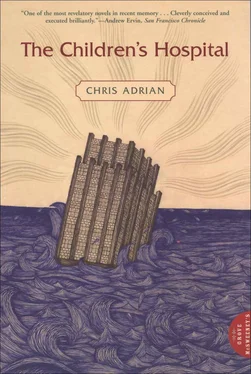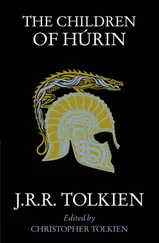“Or something,” said Monserrat. The nearest door led into a salon complex, a gym and a spa, and a row of doors that opened onto dusty massage tables. They found a shriveled magazine in the sauna. Ishmael put his finger in the third mud-tub they found.
“Don’t touch it,” said Vivian.
“Maybe it’s beauty mud,” he said.
“If you put it on your face, I’m not letting you back into the hospital,” Jemma said. But he only held up her finger and stared at it a moment before wiping it on his wetsuit. Outside was the big pool, covered with a fine layer of dust, but not muddy, an empty restaurant, and two long buffets filled with mummified food, shrunken heads of lettuce and dusty shrimp nubbins and pies caved in like old faces.
“Did they leave in a hurry?” Ishmael asked, considering a Renaissance-fair-sized turkey leg. He dropped it on the deck, making a dull thud that was echoed seconds later by a loud thud somewhere on the deck above them.
“What’d you do?” Vivian asked him. They all stood very still by the buffet, listening, Ishmael with his gun held up next to his ear, but they heard nothing else. They continued exploring; the Lido deck was empty but for dust and old food. On the next floor down they found the first rooms. The ones that were open were empty except for piles of dust, gathered in the carpet, pooled in the sinks, layered on top of the neatly turned down beds and the pillow-chocolates. At the rooms that were locked they knocked but no one answered. Ishmael broke one in with four hard kicks and two blows with his shoulder. He stumbled through the broken door and fell onto the bed, sending up a huge cloud of dust that sent them all backpedaling into the hall, coughing and sneezing. Ishmael emerged, face sooty, wiping dust from his eyes. “Nobody home,” he said.
“These are the fancy rooms,” Monserrat observed. “They all have the nice balconies, but they’re still so small. I was going to take a cruise with my husband, before. It seems like such a terrible idea, now, floating for days out on the water. And so small! My room is bigger, over there. To think that people used to go float on the water on purpose. Where could the fun possibly be in that?”
Past the coffee bar and the library, through the perfumery and a shop with towering shelves full of sentimental porcelain figures, down a grand stairway and through a green atrium, through two dining rooms, into the kitchens and down the stairs again, they continued, finding no one, slowing and stopping when they came into a narrow hall lined on either side with photographs of the passengers. There were hundreds of them to look at — anyone who stepped off the gangplank had become the subject of an unsolicited portrait. Jemma blackened the elbows of her blue wetsuit rubbing dust from the glass to better see the faces. Without speaking they proceeded in tiny side steps down the hall, two on either side, looking at every picture, until Vivian’s phone rang. “I told you not to call me again,” she said, but then her tone softened. “Oh. Oh. Okay, we’ll hurry. There’s nothing here, anyway.” She turned to Jemma. “It’s Rob,” she said. “He says the boat’s drifting. His little meter is reading increasing tension on the line. How much?” she said into the phone again. “That unit means nothing to me. Is that a lot? Okay.” She hung up. “He did a calculation. If the drift continues at the current rate then we have four hours before the line breaks.”
“There’s no one here,” Jemma said, peering at an apple-shaped lady in a tennis visor. She wore a pair of capri pants and a striped tank top — a sort of uniform, there were twenty other women in the hall wearing the same thing. “Look at them all. They were all here, and now no one’s here.”
“We should split up,” said Ishmael, “if we’re in a hurry.”
“There’s no one here,” Jemma said again, shaking her head, but they divvied up the ship, Ishmael getting the most territory, Jemma the least. She only had to look on the rest of this deck. They split up, phones switched to walkie-talkie mode. Jemma turned away from the pictures and continued down the hall, peeking behind another set of bars, resisting the call of the karaoke room — the stereo was quiet but the screen was still actively scrolling the lyrics to “You’ve Got a Friend”—and coming finally to the casino. It was the last room on her deck, so she took her time searching it. Twice the every-fifteen-minute call came on her phone, all of them reporting how they’d found nothing. There was nothing behind the bar in the casino, no one in the fancy marble bathrooms, no one under the blackjack table. Cups of coins still sat on stools next to the slot machines. She played a couple, and wasted twenty minutes demonstrating her bad luck. Worse than the slot machines was the roulette table — it sucked her in. She placed a few bets, but soon forgot them, entranced by the way the ball bounced, rolled, and settled, and complicated the game by rolling the ball from the far end of the table, or tossing it from five, ten and fifteen paces. At twenty it bounced off the table and rolled far away, disappearing under a table in one of the four adjoining bars. Jemma got down on her knees to chase it, and found herself face to face with the boy as soon as she lifted the cloth. About fourteen, dressed in a pair of shorts and a Hawaiian shirt, he had his arms wrapped tight around himself, a plush dolphin and a leather-covered book clutched to his chest. She touched him — he was warm. A thin strand of hair blew away from his mouth with every breath he took, then settled again against his face. Jemma closed her eyes and found him not there in head. She opened them again and prodded his shoulder with her fist. “Hey,” she said. “Wake up.”
True to Rob’s prediction, the boat did not stay with them for long. An hour after they brought the boy back to the hospital the boat began visibly to drift behind them. The ropes snapped, and the gangway that twenty citizens were hastily constructing in a hallway of the seventh floor never had a chance to be lifted into position. The boat simply stopped moving, but they did not. It passed farther and farther behind them while a small crowd stood watching on the roof. Everybody had the feeling it was going to sink, but it only passed into a patch of gray mist. When it was gone people hung their heads, their hopes of attaching a luxury annex to the hospital finally dashed. Dr. Tiller pointed out derisively that they probably had more dance floors and movie theatres and massage rooms in the hospital than the boat had, anyway.
They took the boy to the PICU. A cautious nurse had stored a bed, instead of tossing it out the window in the big purge, many weeks before when so many hospital beds and IV poles and bedside commodes had gone to their rest in the sea. So he lay under display of his entirely normal vitals, in a room decorated with the drawings of the second-graders who used it as an art studio, his clothes folded neatly on a chair next to his head, his dolphin under his arm, and his book under his hand. It looked like a diary, complete with a lock. No one had opened it yet.
“He looks fine,” Vivian said.
“Almost,” Jemma said. “I really think he’s just sleeping.” She had tried to wake him up across the water, sending a spark through her finger that should have made him jump, but it didn’t even interrupt his snoring. “Well,” she said to Vivian. “I think I’m ready. Would you send the kids in?” She’d asked for her class to be there, to watch and maybe to learn and maybe even to help, or maybe because to involve them, even in the most peripheral way, was more like teaching them something than were games of scrabble, picnics, and her cheating game of hide-and-go-seek. The majority of the crowd had transferred itself from the roof to the space outside the PICU. Inside there were only members of the Council, people Jemma wanted there, and a few citizens chosen by quickly drawn lots. The kids filed through into the room. Someone had arranged them from smallest to largest. They were all very subdued. Even Jarvis looked awed, and was very well-behaved. They stood in a semicircle around Jemma, all joining hands without her even asking them to do it.
Читать дальше












